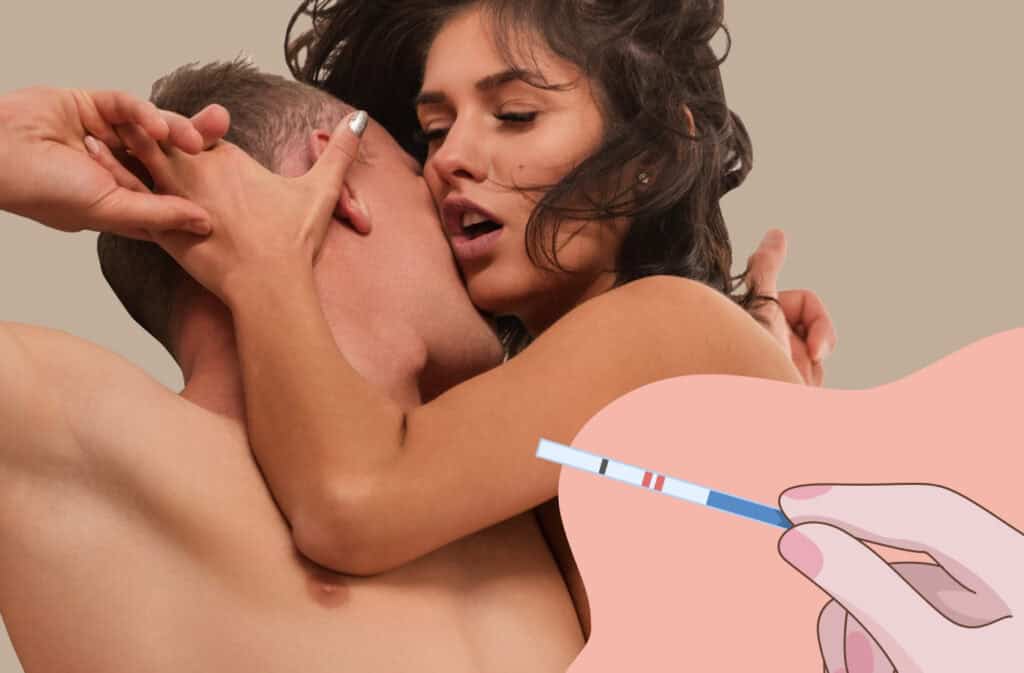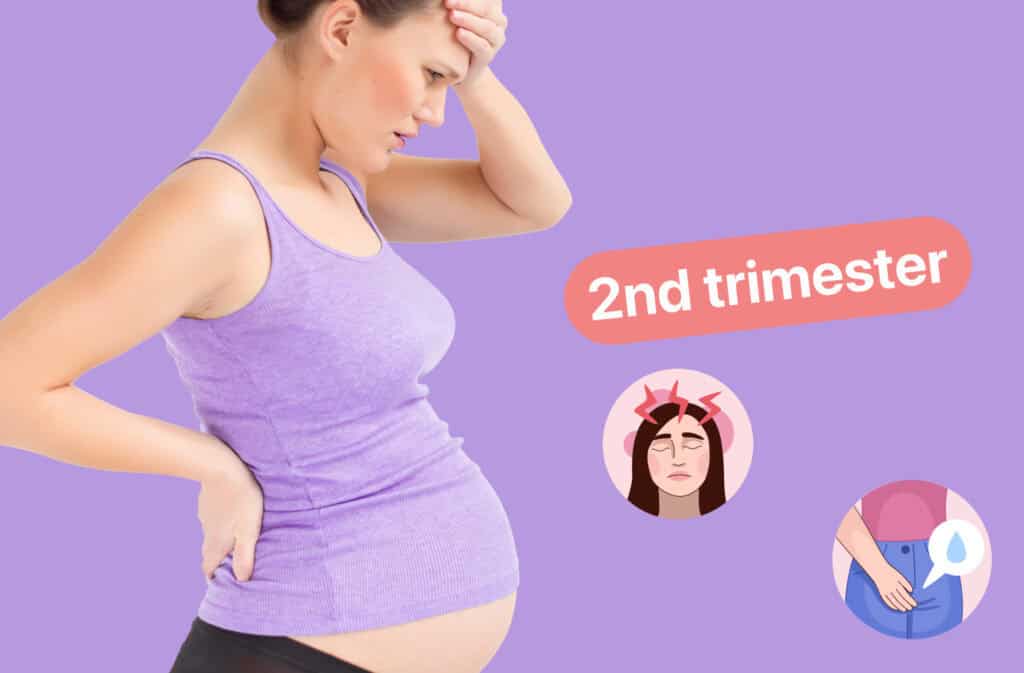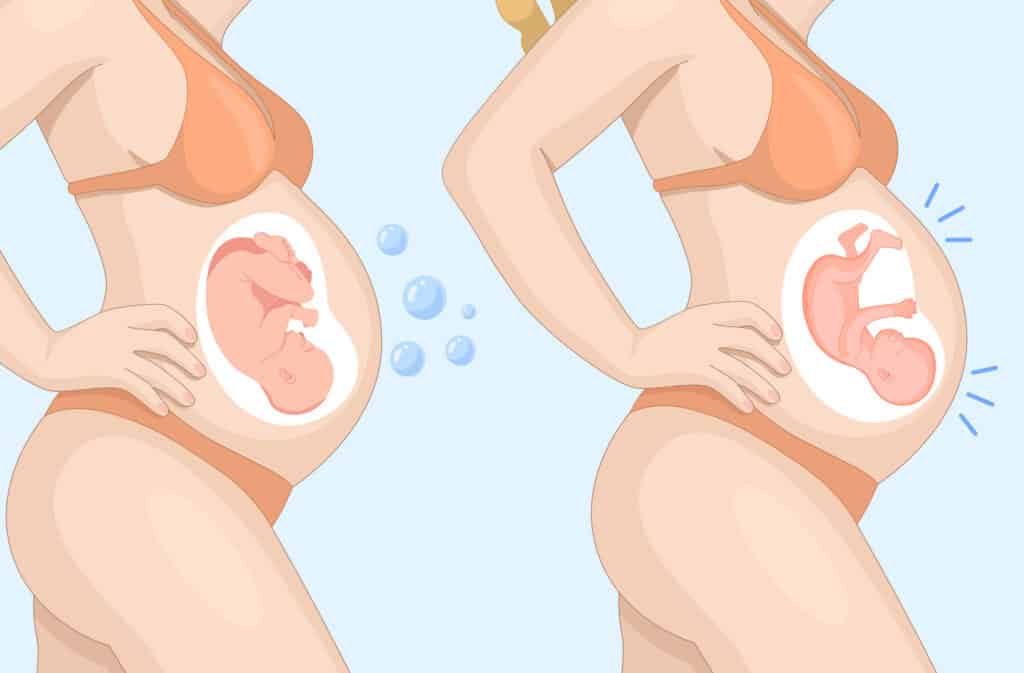Femia > Health Library > Getting Pregnant > Trying to conceive > When to have sex during ovulation: Your guide to maximizing fertility
When to have sex during ovulation: Your guide to maximizing fertility

- Updated Feb 11, 2025
- Published
CRAFTED BY HUMAN
Crafted by human At Femia, we provide accurate and up-to-date information at every stage of your journey, from trying to conceive, pregnancy and postnatal support. All content is created by a real person based on in-depth research and own professional experience. Femia ensures that you will receive expert advice, strict accuracy and a personalized approach from our authors/medical experts. Learn more about our editorial policy.
FACT CHECKED
Fact checked At Femia Health, we maintain the highest standards of editorial excellence in delivering content focused on helping you conceive, guiding you through pregnancy, and supporting you postpartum. Explore our content review principles to learn how we ensure the accuracy and quality of our health and lifestyle tips for every stage of your journey.

Created with Hector Chapa, MD, FACOG, Clinical associate professor, Obstetrics and Gynecology Texas A&M University, College of Medicine in Bryan-College Station, USA
You’re most fertile in the five days leading up to ovulation and the day of ovulation itself. This period of time is called your ”fertile window.”You should aim to have sex every 1–2 days during your fertile window. Sex 1–2 days before you ovulate gives you the highest chances of conceiving.
Use ovulation tracking tools like ovulation predictor kits (OPKs), cervical mucus changes, and fertility apps to help you predict when your fertile window is and improve your chances of getting pregnant.
If you’re trying to get pregnant and wondering when to have sex during ovulation, then you’ve come to the right place. Getting pregnant is not always straightforward, and the timing of when you have sex matters. Your chance of getting pregnant varies greatly depending on where you are during your menstrual cycle when you have sex. To give yourself the best possible chance of getting pregnant, you need to be having sex around ovulation.
This guide to sex during ovulation will break down what ovulation is, when you should have sex during ovulation, and how to predict when you might ovulate.
Use Femia’s easy-to-use ovulation tracker, symptom log, and daily insights
to understand your fertility better and increase your chances of conception
What is ovulation and when does it happen?
Ovulation is when a mature egg is released by one of the ovaries. It usually happens around 14 days before the start of your next period. This means if you have a typical 28-day menstrual cycle, ovulation will likely occur around day 14 of your cycle. However, if your menstrual cycle is longer or shorter, then the day you ovulate will likely be a bit earlier or later. For example:
Example 1: If you have a 21-day menstrual cycle, you can expect to ovulate around day 7.
Example 2: If you have a 35-day menstrual cycle, you can expect to ovulate around day 21.
| Important to understand |
|---|
| According to the American College of Obstetricians and Gynecologists (ACOG), a normal menstrual cycle typically lasts between 21 and 35 days. If your menstrual cycle is shorter or longer than this, or it’s difficult to predict the length, then this could indicate an underlying condition that may affect your fertility. If you have any concerns about your menstrual cycle, or if you’re ovulating, then reach out to your healthcare provider. They will be able to discuss your concerns and arrange any tests you might need. |
When to have sex during ovulation: Understanding the fertile window
The fertile window is a six-day period of time when it’s possible to get pregnant. It includes:
- The five days leading up to ovulation.
- The day of ovulation.
👉Find out more: Best sex positions to get pregnant: Tips for optimizing conception
The concept of the fertile window is based on the knowledge that sperm can survive in the female reproductive tract for up to five days. So, having sex in the five days before you ovulate can result in pregnancy. However, your chances of conceiving will vary depending on what day during the fertile window you have sex. A large study from 2000 looked at the fertile window in over 800 women to determine the chances of conceiving on each day. Here are the findings:
| Number of days before/after predicted ovulation* | Chance of conceiving (%) |
|---|---|
| 6 days before | 3 |
| 5 days before | 6.8 |
| 4 days before | 18 |
| 3 days before | 24 |
| 2 days before | 26 |
| 1 day before | 21 |
| Day of ovulation | 10 |
| 1 day after | 1 |
*Day of ovulation is an estimation based on tracking cervical mucus and basal body temperature so unlikely to be 100% accurate.
The best time to have sex to get pregnant
To have the best chance of getting pregnant, the ACOG recommends having sex at least every other day during the fertile window. Having sex one to three days before ovulation will give you the highest chance of conceiving; however, it can be very difficult to accurately predict when you’re going to ovulate. This is why having sex every 2–3 days throughout your menstrual cycle (outside of your period) is recommended if you’re trying to get pregnant, as it ensures that you will cover at least some of the fertile days.
If you use ovulation tracking tools like the Femia app or ovulation tests, then you might have a good idea of when you ovulate. While it won’t be 100% accurate, it can help you to determine your fertile window and time sex accordingly.
When to have sex after a positive ovulation test
Ovulation tests are at-home tests that you pee on (like a pregnancy test) that will tell you when you’re about to ovulate. Just before you ovulate, you get a surge in the hormone luteinizing hormone (LH). This surge triggers your ovary to release an egg. Ovulation tests detect the amount of LH in your urine, and when it detects a surge in LH, you will get a positive result. This tells you that you’re likely to ovulate in the next 12–36 hours, and having sex on the day you get a positive test will give you the best chance of conceiving.
According to the American Pregnancy Association, while ovulation tests are 99% accurate at detecting an LH surge when used correctly, they don’t tell you if you have actually ovulated. Sometimes, an underlying condition can mean that, despite having an LH surge, you don’t actually release an egg. There are also times when you can experience false LH peaks before the actual peak, causing you to mistime sex. False peaks are commonly seen in women with polycystic ovary syndrome (PCOS).
How often should you have sex to get pregnant?
When it comes to getting pregnant, there is no such thing as ”too much sex”; however, the most important thing is that both you and your partner are comfortable with the sex you’re having. While having sex every 1–2 days during your fertile window is recommended, putting too much pressure on yourself or your partner can make sex stressful and unenjoyable.
Stress can interfere with ovulation—a study of 274 fertile-aged women, published in Fertility and Sterility, found that stress can significantly reduce the chances of conception in women. Another, 2015 study, published in Epidemiology, looked at 259 women and also found that stress can affect fertility. Results showed that stress significantly increased the chances of having an anovulatory cycle (no egg released) in women with no known fertility problems. If you’re not ovulating, then you will not be able to get pregnant.
👉Find out more: The best prenatal vitamins for pregnancy: Recommendations from the OBGYN
Chances of getting pregnant on ovulation day
Your chances of getting pregnant if you have sex around the time you ovulate and have no known fertility problems are around 33% for each cycle. Approximately 8 out of 10 couples (80%) will become pregnant within the first six months of trying to have a baby.
Your chances of conceiving are at their highest if you have sex one to two days before you ovulate. They then drop quickly after the egg is released, as it can only survive for 12–24 hours.
How many days after ovulation can you get pregnant?
An egg can only survive for up to 24 hours after it’s released, so having sex the day after you ovulate can result in a pregnancy, but any later than that, and it’s extremely unlikely.
Focus on the entire fertile window, not just the day of ovulation. Accurately predicting ovulation is valuable, because it helps you identify your fertile window. If you want to give yourself the best chance to get pregnant quickly, aim to have regular sex throughout the fertile window, rather than only on ovulation day.
Can you get pregnant before ovulation?
Yes, you can get pregnant if you have sex during your fertile window, which includes the five days before you ovulate. However, your chances of getting pregnant are not equal across all five days. Your odds of getting pregnant are best if you have sex in the 1–2 days before you ovulate.
Tracking ovulation to time sex correctly
Tracking ovulation can be an effective method to increase your chances of getting pregnant. A 2020 randomized control trial, published in the Journal of Women’s Health, found that women who were using at-home ovulation predictor kits alongside a fertility-tracking app were significantly more likely to get pregnant in the first and second cycle, even though they were having sex less frequently.
Here are some methods to help you identify ovulation:
- OPKs: These detect the LH surge, which occurs 24–36 hours before an egg is released.
- Track your cervical mucus: Cervical mucus changes throughout your menstrual cycle. During the fertile window, your cervical mucus becomes clear, slippery, and stretchy, resembling raw egg whites.
- Track your basal body temperature (BBT): Tracking your BBT daily can help you identify the slight rise that happens after ovulation, although this method is better for confirming ovulation retrospectively.
- Ovulation cramps: Some women experience a one-sided cramp in their tummy when they ovulate. It can be difficult to recognize ovulation cramps but, by tracking any unusual symptoms you have over the course of a few months, you might be able to recognise a pattern. Ovulation cramps can be a useful marker of when you’re about to ovulate and help you time sex.
You can use one or more of these methods to pinpoint your most fertile days. By inputting the information into an app like Femia, you’ll get a stress-free, easy-to-understand menstrual cycle calendar that highlights ovulation and your fertile window. If you become pregnant, fertility apps also provide a record of your last period and likely ovulation date, which can help your healthcare provider to accurately date your pregnancy.
Femia’s fertility tracker helps you track discharge, fertile window,
and symptoms to improve your chances of pregnancy
Tips for improving chances of conception
There are several things that you can do to maximize your fertility and improve your chances of getting pregnant. Here are some tips to help you:
- Eating a fertility boosting diet: Eating a nutritious diet rich in vegetables, fruits, lean protein, and whole grains can help balance your hormones and support reproductive function.
- Get the right amount of exercise: Regular moderate exercise can boost fertility; however, over-exercising can disrupt your hormones and affect ovulation. Create a fertility-friendly workout to help optimize your chances of success.
- Keep sex fun and stress-free: While having regular sex can improve your chances of conceiving, avoid placing too much pressure on yourself or your partner. Aim to have fun, and keep communication open. While there are no proven best sex positions to get pregnant, make sure you’re reducing any possible barriers for the sperm to meet the egg, like lubricants that can harm sperm.
- Track ovulation consistently: Use methods like OPKs, apps like Femia, and cervical mucus monitoring to help you predict when ovulation might occur.
When to consult a healthcare provider
The ACOG recommends consulting a healthcare provider for an infertility evaluation if:
- Under 35: Not pregnant after 12 months of trying to conceive
- 35–40: Not pregnant after six months of trying to conceive
- Over 40: As soon as you’ve decided to try and conceive
Questions from the Femia community
Does stress affect ovulation and fertility?
Yes, stress can interfere with hormone regulation and, consequently, ovulation. Managing stress through relaxation techniques, exercise, or mindfulness can help support a healthy reproductive system and optimize your chances of conceiving.
How accurate are ovulation predictor kits (OPKs)?
OPKs are generally good at telling you when you have an LH surge. While this is useful to determine when you should ovulate, it can’t tell you that you have ovulated. Using them alongside other methods to predict ovulation can help improve your chances of success. If you have any concerns about whether you’re ovulating, reach out to your healthcare provider. They will be able to arrange any fertility tests you might need.
Can irregular cycles make it harder to time sex during ovulation?
Yes, irregular cycles can make predicting ovulation more challenging, but tracking cervical mucus, basal body temperature, and using ovulation tests can help. However, if your cycles are very long, short, or vary by more than seven days, speak to a healthcare provider, as this could indicate an underlying condition that might be affecting your fertility.
Does age affect the chances of conceiving during ovulation?
Yes—fertility naturally declines with age, especially after 35, which can lower the chances of conception even during the fertile window. Age increases the chances of having an anovulatory cycle as well as decreases the quality of your eggs. If you’re over 35 and hoping to get pregnant, then reach out to your healthcare provider. They will be able to offer you personalized guidance.
The bottom line
Having sex during your fertile window, especially in the 1–2 days before you ovulate, will give you the best chance of conceiving. In order to predict when you will ovulate, you can use ovulation tracking tools like OPKs and fertility apps. These will help you to accurately time sex and increase your chances of getting pregnant.
In general, having regular sex every 2–3 days during your cycle, alongside maintaining a healthy lifestyle, will improve your chance of getting pregnant. However, if you have any concerns over your fertility, or it’s taking longer than it should to get pregnant, reach out to a trusted healthcare provider. They will be able to offer reassurance and arrange any fertility tests that you might need.
References
- “Abnormal Uterine Bleeding.” ACOG, www.acog.org/womens-health/faqs/abnormal-uterine-bleeding.
- Colombo, Bernardo, et al. “Daily Fecundability: First Results From a New Data Base.” Demographic Research, by Max Planck Institute for Demographic Research, vol. 3, Sept. 2000, p. Article 5. https://doi.org/10.4054/DemRes.2000.3.5.
- “Evaluating Infertility.” ACOG, www.acog.org/womens-health/faqs/evaluating-infertility#:~:text=Experts%20recommend%20an%20infertility%20evaluation,after%206%20months%20of%20trying.
- “How to Use Ovulation Kits and Fertility Monitors.” American Pregnancy Association, americanpregnancy.org/getting-pregnant/infertility/ovulation-kits.
- Johnson, Sarah, et al. “Increased Likelihood of Pregnancy Using an App-Connected Ovulation Test System: A Randomized Controlled Trial.” Journal of Women S Health, vol. 29, no. 1, Sept. 2019, pp. 84–90. https://doi.org/10.1089/jwh.2019.7850.
- Louis, Germaine M. Buck, et al. “Stress Reduces Conception Probabilities Across the Fertile Window: Evidence in Support of Relaxation.” Fertility and Sterility, vol. 95, no. 7, Aug. 2010, pp. 2184–89. https://doi.org/10.1016/j.fertnstert.2010.06.078.
- “Optimizing Natural Fertility: A Committee Opinion.” Fertility and Sterility, vol. 117, no. 1, Nov. 2021, pp. 53–63. https://doi.org/10.1016/j.fertnstert.2021.10.007.
- “Polycystic Ovary Syndrome (PCOS) – Symptoms and Causes.” Mayo Clinic, www.mayoclinic.org/diseases-conditions/pcos/symptoms-causes/syc-20353439.
- Schliep, Karen C., et al. “Perceived Stress, Reproductive Hormones, and Ovulatory Function.” Epidemiology, vol. 26, no. 2, Jan. 2015, pp. 177–84. https://doi.org/10.1097/ede.0000000000000238.
- “Sperm: How Long Do They Live After Ejaculation?” Mayo Clinic, www.mayoclinic.org/healthy-lifestyle/getting-pregnant/expert-answers/pregnancy/faq-20058504#:~:text=Ejaculated%20sperm%20remain%20viable%20for,decades%20when%20semen%20is%20frozen.
- “Trying to Get Pregnant? Here’s When to Have Sex.” ACOG, www.acog.org/womens-health/experts-and-stories/the-latest/trying-to-get-pregnant-heres-when-to-have-sex.

Look out for these danger signs of pregnancy during your second trimester which require immediate medical attention.

Learn to distinguish between gas bubbles and baby movements during pregnancy. Understand key differences, timing, and when to consult your doctor. Expert advice from Femia.

Discover 7 natural ways to boost fertility in women. Learn about diet, lifestyle changes, and timing intercourse. Expert tips to increase your chances of getting pregnant.
